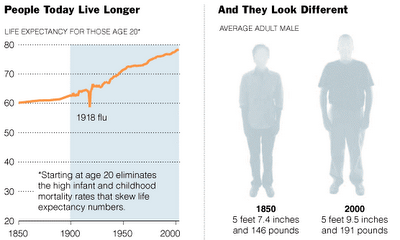
(view more graphs and a look at the decline in chrnoic illnesses)
One of the most interesting things is that no one seems to know exactly why this is. Is it due to better medical knowledge? More pharmacuticles? Improved sanitation? Better neo-natal care? More nutrition? Better exercise? More leisure? Enhanced technology (such as air conditioning and indoor plumbing)? Less physically risky work on average? Increased education levels and literacy rates? I'd guess it is a combination of many of these. I wonder how a cross-country comparison would look? Particularly comparing developed vs. developing countries.
The difference does not involve changes in genes, as far as is known, but changes in the human form. It shows up in several ways, from those that are well known and almost taken for granted, like greater heights and longer lives, to ones that are emerging only from comparisons of health records.
The biggest surprise emerging from the new studies is that many chronic ailments like heart disease, lung disease and arthritis are occurring an average of 10 to 25 years later than they used to. There is also less disability among older people today, according to a federal study that directly measures it. And that is not just because medical treatments like cataract surgery keep people functioning. Human bodies are simply not breaking down the way they did before.
Even the human mind seems improved. The average I.Q. has been increasing for decades, and at least one study found that a person’s chances of having dementia in old age appeared to have fallen in recent years.
Thought of the Day: One of the coolest things I love about studying economic development is that no matter which of these factors it is,economic growth will help bring more of it.
Hattip Instapundit
No comments:
Post a Comment